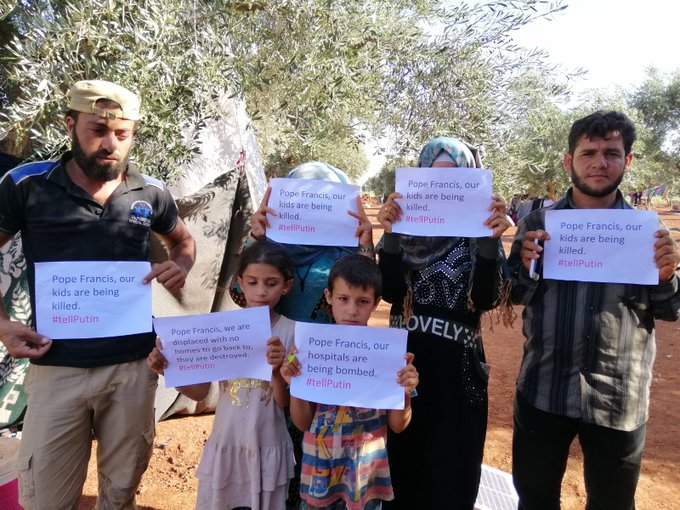“Tell Putin”

On 4 July 2019, Pope Francis was due to meet with Russian President Vladimir Putin. The meeting came at an appalling time for Syria. Putin, along with Assad, had launched a devastating attack on Idlib, putting millions of civilian lives at risk. That June, Putin had remarked that Russian forces were gaining “practical experience” in Syria, which “they could not have obtained during any peacetime exercises.”
Although it was clear that Putin did not care about the casualties his country was inflicting, nor upholding international law, we knew that Pope Francis could be persuaded to speak out. Ahead of 4 July, and along with a coalition of Syrian organisations, we launched a social media campaign around the hashtag #TellPutin, urging the Pope to bring up the bombing of Idlib with the Russian president.
To help the hashtag travel further, we shared powerful photos of people in Idlib holding up paper signs asking the Pope to help them, while Dr Hamza al-Khatib launched a petition asking people to tweet the Pope, which close to 800,000 people responded to. The campaign was covered by 35 media outlets worldwide, including the Russian publication Novayagazeta, Syria TV, and the Vatican press. On Twitter, the hashtag reached 5.6 million people, receiving more than 3,000 tweets from 1,300 twitter accounts, including from the head of Human Rights Watch. On Facebook, reach was around 1 million people.
In the end, the Pope did not publicly criticise Putin, although the pair did discuss Syria in their private meeting. Despite this, our campaign was still a success as it got people talking about Russia’s bombardment of Syria, and it received considerable media pickup.
What we learnt
Capitalising on a major news story can be an effective way to raise awareness of an issue, but media interest is key.